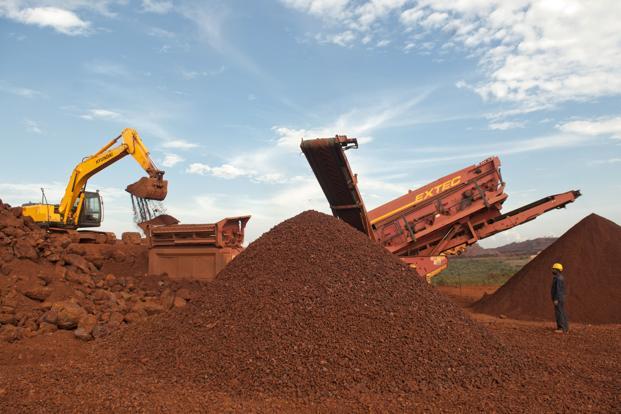The Supreme Court Thursday cancelled all leases for iron ore extraction in 49 category C mines in Bellary, Tumkur and Chitradurga districts of Karnataka.
The apex court forest bench headed by Justice Aftab Alam said the proceeds from the sale of iron ore extracted from category C mines would stand forfeited and would go to special purpose vehicle constituted for the reclamation and rehabilitation of the mining area devastated by illegal mining.
The court confirmed its earlier order permitting mining activities in 18 category A mines. The court, however, put an embargo on the mining activities in seven mining leases falling in Karnatata-Andhra Pradesh border areas.
The court said the mining activities, in seven mining leases would remain suspended till the demarcation of boundaries between the two states is cleared.
The court vacated its earlier order restraining issuance of fresh mining leases.
The order pronounced by Justice Ranjan Gogoi accepted a number of recommendations of the court-appointed Central Empowered Committee (CEC) on green matters given in its various reports from 2011 to February 2013.
The CEC divided mines in the area in three categories, A, B and C depending on the extent of mining in the districts.
SC’s Karnataka mining order: All you wanted to know
In a big relief to the steel sector, the Supreme Court today allowed mining from nine more iron ore mines, which it had banned in 2011. Shares of steel and mining companies rallied reacting to the news. Kalyani Steel rose 15 percent but JSW Steel was down 2 percent at 12:49 pm.The ban on mining had crippled the steel sector as companies were forced to import low grade iron ore.
The SC had in 2011 banned iron ore mining in Bellary, Chitradurga and Tumkur districts of Karnataka citing environmental violations, and had asked Central Empowered Committee (CEC) to carry out an environmental impact assessment.
Here are more details of the order and its impact
What analysts say
The court order on category B mines is a relief for Sesa Goa, which has 2.29 million tonne from these kinds of mines in Karnataka. It will take five-six months for these mines to come on stream. The move is positive for JSW steel and Kalyani Steel, Abhishar Jain of Centrum Broking told CNBC-TV18.
After resuming operation in Karnataka, JSW Steel will be able to enhance capacity to over 80 percent level. The company owns a 10 million tonne per annum (mtpa) steel plant at its flagship factory at Vijayanagar which had been running at abysmally low capacities when mining of iron ore was banned in Karnataka in July 2011.
Angel Broking said for Sesa Goa the order is only marginally positive as for the company Goa is the most important and there is no clarity about mining there. As far as the reopening is concerned, the key will be how the rehabilitation and resettlement of the project-affected people are taken care of. He expects the order to result in an iron ore output of 5-6 million tonne a year.
Reuters
What companies say
Both Kalyani Steel and JSW Steel welcomed the order. According to Kalyani Steel’s RK Goel the order will definitely help in larger availability of iron ore. He expects the reopening of mining to take up to two years. The company is now functioning on 60 percent capacity which will be increased to 100 percent.
Vinod Nowal of JSW Steel said the mines will come on stream in one to three months. On the company’s earnings, there is likely to be a huge impact. As of now the company is buying low grade ore and is paying about Rs 3,000 per tn as freight. This will come to Rs 500-600 per tonne, he said.
What the SC order means for mines in Karnataka
Karnataka expects to have 27-28 iron ore mines operating in 2013-14, from the present nine, if the Supreme Court allows to open so many. The state is expected to mine 30 million tonnes of iron ore this fiscal year.
India used to produce 200 million tonne of iron ore, half of which was exported, until Supreme Court in 2011 clamped down on illegal mining mainly in Karnataka and Goa. China was the biggest buyer of iron ore from India.
The Court had earlier allowed category A mines to be open. With the new order, the number of mines that could become operational in Karnataka is about 60. The new order, however, does not allow mining in category C mines.
Why was mining banned
Bellary district in Karnataka was a hotbed of illegal mining. A probe by Lokayukta had found the state exchequer suffered a loss of Rs 16,000 crore as companies like Obulapuram Mining Company of then state ministers G. Karunakara Reddy and G. Janardhana Reddy allegedly mined iron ore without paying royalty to the government. It was also alleged that these companies violated environmental norms too.
The Lokayukta report said in 2009-10, as much as 1,27,99,396 metric tonnes of iron ore was illegally exported from Bellary and in 2008-09, it was 53,55,660 tonnes. Many mining licences issued in Bellary were backed by companies which acted as a front for the Reddy brothers, it is alleged.
The court had banned mining in response to a public interest litigation filed three years ago. The PIL wanted a ban on illegal mining and a high-level inquiry into the role of politicians. Top leaders from Congress, Bharatiya Janata Party and Janata Dal Secular were named in the PIL. The key among them were the Reddy brothers who are being investigated by the CBI right now, while then Karnataka Chief Minister BS Yeddyurappa who is also alleged to be involved, is out on anticipatory bail.
Supreme Court constituted central empowered committee to look into mining in Karnataka. In September, the Supreme Court allowed 18 mines in Karnataka to resume operations, while state-run miner NMDC was cleared to produce one million tonnes a month in August 2011.(FP)

